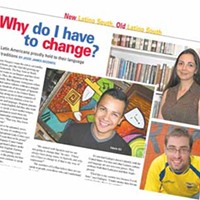To live and love across these boundaries is an immutable fact of life for recent Latino immigrants, and Marin's Charlotte-based rock band La Rúa has captured that reality in its popular song "El Chanchito," which translates into English as "The Piggybank." A hit on local Spanish-language radio stations, the song tells the story of a young immigrant, Samuel, who works and saves his money to help his girlfriend Marta come to the United States.
"'El Chanchito' hits home to many immigrants and we are excited that through our music — our passion — we can tell this universal story right here in Charlotte," says Marin's band mate in La Rúa, guitarist Tony Arreaza, a native of Venezuela.
More than a half-million Hispanics have immigrated to North Carolina since 1990. They fill vital roles in our economy, from working farms and construction jobs to sitting on the boards of corporations and serving as elected officials, and they've found neighborhoods to call home. Yet many Latinos continue to visit their countries of origin every year, or send cash and goods back to support their families or help them immigrate to the United States. Hispanic grocers thrive on wire transfers and international calling cards, not to mention the corn tortillas and banana leaves that provide a taste of childhood homes. By cultural training and circumstances of life, Latino immigrants come to see themselves as citizens of the Western Hemisphere — Americans not by immigration status or national identity, but by birth and a heritage both European and indigenous.
"America, it's a continent. It's a continent divided in three different regions, North America, Central America and South America," says Marin, who remembers pining for the day he could finish his studies in Ecuador and join his immediate family in Charlotte. "I'm an American, also. It's a word (that) describes all the people who live in America."Here in the United States, we are used to thinking of ourselves as American and everyone else as something other. We expect those who call themselves Americans to speak English and share our customs. The Latino immigrants in our midst seem like outsiders, yet their Spanish language has a centuries-long history beneath this country's Anglo surface. As archaeologists uncover North America's forgotten Latin identity, immigrants like Marin embrace Cuban poet Jose Marti's vision of nuestra América, "our America."
San Juan, North CarolinaAmerica's new Spanish rhythm isn't really as new as it may seem. As the borders dividing Latin and Anglo America collapse, much to the dismay of some on the northern side, archaeologists are digging up evidence that Spanish-speaking explorers catalyzed this country's origins. Not just in places of clay-capped Catholic missions and Spanish-sounding names like La Florida, or in the former Mexican lands that stretched northward through Nevada ("snow-capped," en espaol), but in such anglophonic, historically Protestant places as Morganton, in Burke County, just 75 miles northwest of Charlotte.
In the spring of 1567 — two decades before England settled its "Lost Colony" on Roanoke Island and more than two centuries before Scots-Irish immigrants founded the city of Morganton — the Spanish explorer Capt. Juan Pardo left 30 soldiers to occupy a fort they had built in the Appalachian foothills. Archaeologists think they've found shards of Spanish pottery and leftovers from meals the soldiers ate that year. The same records that led archaeologists to the Morganton area also suggest that the Iberians built another fort as far inland as Dandridge, TN. And before Pardo led two expeditions through the Carolinas and Tennessee in the late 1560s, Hernando de Soto explored the same region in 1539 and 1540.
"You can't understand the 18th-century Anglo-American history if you don't understand the 16th-century Spanish exploration," says Fort San Juan's lead digger David Moore, an archaeologist at Warren Wilson College in Asheville.
Today, in Morganton, just 12 miles from Fort San Juan's ruins, you'll find Rinçon Hispana, or "Spanish Corner," a tiny store stocked with banana leaves, baby coconuts and tamales. Inside, you may hear the music of Annette Moreno y Jard'n, a Christian rock band whose albums are shelved among hundreds of religious CDs, DVDs and videos. The group sounds much like Nashville's contemporary Christian music but for the Spanish lyrics. Proprietor Juan Palacios advertises Rinçon as a Christian bookshop, and like many of the Guatamalan households that have popped up in Morganton over the past 15 years, the store is both Latino and distinctly American.





